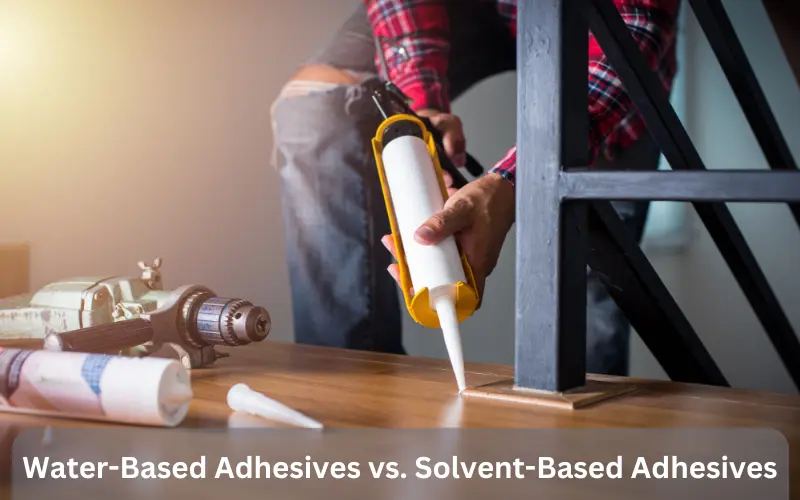Adhesives are indispensable in many industries, such as construction and manufacturing. They serve as vital binding agents, ensuring the strength and resilience of materials. Within the adhesive realm, two primary contenders reign supreme: water-based Adhesives and solvent-based adhesives.
From furniture construction to intricate machinery assembly, adhesives find their application in myriad scenarios. Understanding the nuances between water-based and solvent-based variants is paramount in selecting the optimal adhesive for your needs.
Water-Based Adhesives Vs. Solvent-Based Adhesives

What are the Advantages of using Water-based Adhesives?
As the name suggests, water-based adhesives use water as the primary mixer. These adhesives are becoming increasingly popular due to their environmentally friendly nature. They are very simple to use. You have to mix the solution into a bunch of water, and you will be ready to use Adhesive for any application.
One of the major advantages of water-based adhesives is their minimal impact on the environment. These adhesives are safer for indoor applications and reduce workers’ risk of respiratory issues. Not only that, these adhesives don’t have a strong smell. Hence, we can safely use them in outdoor and indoor conditions.
Water-based adhesives are generally easier to clean up and dispose of, making the post-work cleanup simple.
What are the Disadvantages of using Solvent-based Adhesives?
One of the biggest problems with adhesives that use solvents is that they emit a higher amount of VOCs and can pose health and environmental hazards if not handled properly.
Also, they are not suitable for use in indoor locations, and if used, they should be in a well-ventilated space. Additionally, they are not suitable for use as furniture, as they may cause slight degradation in the wood quality over time.
Also Read: Exploring Lamination Adhesives Manufacturers in India
How to Choose the Right Adhesive for Your Needs? Water-Based Adhesives or Solvent-Based Adhesives
Choosing the right type of adhesive is important, as you have to choose the one that suits your needs. Numerous factors must be considered before you choose a water-based or solvent-based adhesive.
1 – Compatibility
One of the primary factors to consider is the compatibility of the adhesive with the materials being bonded. Different adhesives have varying affinities for specific substances, such as metals, plastics, wood, or fabric. Selecting an adhesive that can effectively bond to the intended materials without causing any damage is imperative.
2 – Application Process
Before choosing an adhesive, consider the method of application. You should know the process of applying the adhesive, including spray coating, brush coating, automated coating, or anything else. Make sure that you are compatible with the application process, as choosing the wrong one can cause certain issues with bonding and may not provide better results.
3 – Durability
The strength and durability of the adhesive must be considered before choosing the right one. For example, different adhesives have different levels of strength and durability. Depending on the materials, the bond’s durability and strength might vary. It’s better to consult the technicians regarding this factor.
Final Words
Adhesives play an important part in the industrial setting, and it’s quite difficult to understand the difference between various types of adhesives. Water-based and solvent-based adhesives are very common, and you should know the difference between the two. In this post, we tried our best to share everything about water—and solvent-based adhesives. If you have any questions, feel free to ask them in the comments section below.
Also Read: Best Adhesives Used for Packaging: ‘Super Bond Adhesives’ SUPER MELT Series












